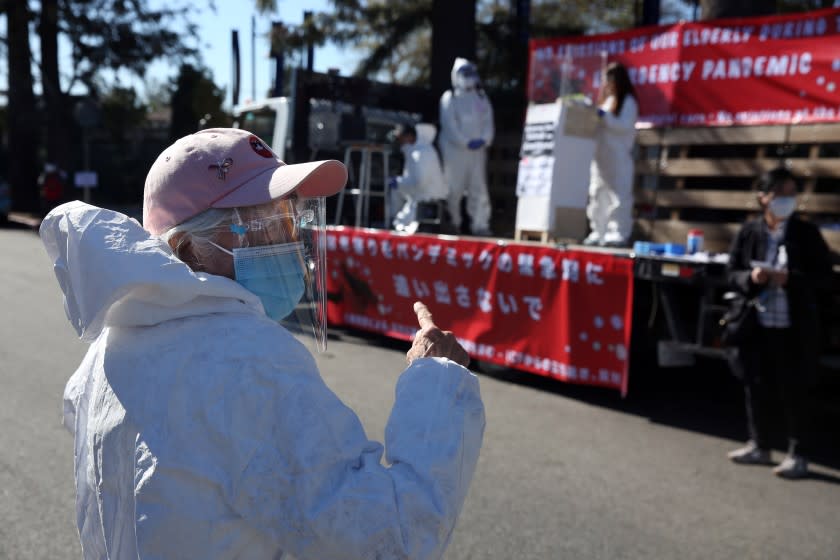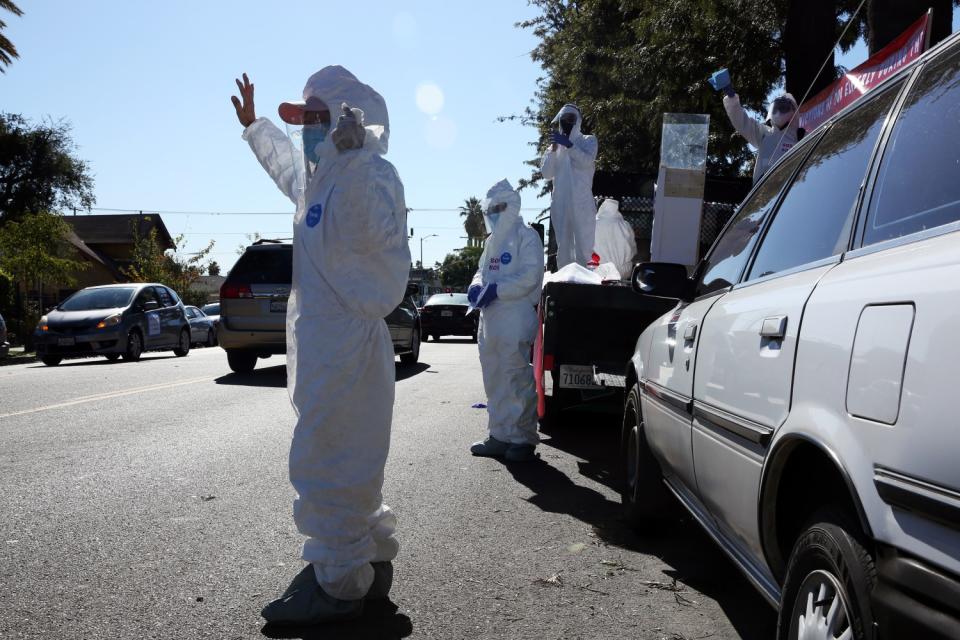Sakura Gardens retirement home, a last vestige of Japanese American Boyle Heights, faces partial closure

Kotoko Toji has lived in Los Angeles since the 1950s but speaks little English.
When it came time to move to a retirement home 15 years ago, she had a request: Sakura Gardens.
Like Toji, many of the residents are Japanese Americans in their 80s and 90s. Most of the staff speaks Japanese.
On the Japanese holiday of Girls’ Day, Toji and her friends eat sakuramochi — a sweet rice cake filled with red bean paste and encased in a pickled cherry blossom leaf.
Sakura Gardens is a last vestige of Japanese American culture in Boyle Heights.
Since the facility opened in the 1970s, most businesses catering to Japanese residents have closed as the neighborhood solidified into a working-class Latino enclave.
Now, a portion of Sakura Gardens is in jeopardy. The owner, Pacifica Cos., has drafted plans to eventually turn Sakura's intermediate care facility into a housing complex. A five-year agreement to preserve the facility expires Saturday.
Pacifica said Thursday that it will not immediately demolish the facility and is in "an exploratory review" of what to do with it.
Still, residents are worried about where they will go if they are forced to leave during the COVID-19 pandemic — and, especially, whether they will find a place that caters to their Japanese backgrounds.
“This is what mattered most to my mom, just being able to socialize and speak with others and ask questions of the … workers in Japanese,” said Toji's son, Michael Toji.
Sakura Garden's intermediate care facility, on South Boyle Avenue a few blocks from Mariachi Plaza, is home to more than 60 residents who do not require intensive services.
Car protest in Boyle Heights over the potential closure of an intermediate care facility that serves about 64 elderly Japanese American residents, mostly women in their 80s & 90s, this morning. #BoyleHeights pic.twitter.com/26DZPQdNU2
— Andrew J. Campa (@campadrenews) January 26, 2021
The Sakura complex also contains an assisted living facility with about 120 residents and a memory care facility housing 20 residents with Alzheimer's and dementia.
Pacifica, a San Diego real estate development company with projects nationwide and in India and Mexico, said it has "continued to fund millions of dollars in losses" to keep the intermediate care facility running.
"This is not sustainable," the company said in a statement Jan. 26, also referring to intermediate care facilities as "obsolete."
In August, Pacifica filed paperwork with the City Planning Department to convert the intermediate care facility to a 45-unit apartment building.
Pacifica also plans to build a 50-unit, 40,000-square-foot apartment complex elsewhere on the property, along with a parking structure.
But "none of the current residents of the ICF will be evicted," the company said in the Jan. 26 statement.
“In light of the unprecedented healthcare crisis related to COVID-19 … Pacifica is developing a plan to partner with residents, family members, facilities and the community to ensure the availability of necessary services and safe care options to meet the needs of the Sakura ICF seniors," the statement said.
No plans have been announced for the assisted living or memory care facilities.
David Monkawa, a spokesman for Save Our Seniors, a grass-roots group that has been trying to save Sakura Gardens, is wary of Pacifica's assurances.
“They say one thing, but then their actions say another,” he said. “If they’re interested in keeping the ICF open, why file to tear it down? The truth is they’ve been losing money for years and are looking for a way out.”
Sakura Gardens was founded by Keiro, a nonprofit that provides culturally sensitive services to older Japanese Americans.
Keiro, whose name means "respect for our elders," opened the Sakura Gardens assisted living facility in 1975 and the intermediate care facility two years later.
In 2016, Keiro shifted from running retirement facilities and sold Sakura Gardens, as well as facilities in Lincoln Heights and Gardena, to Pacifica, despite community backlash.
Kamala Harris, who was state attorney general at the time, approved the sales while stipulating that existing services at the facilities would continue for five years.
The Sakura Gardens intermediate care facility has not had any COVID-19 cases since the pandemic started, said representatives of Pacifica and Save Our Seniors, even as many other nursing facilities and nearby East L.A. communities have been hit hard by the virus.
The adjacent assisted living facility has had a "few cases" of COVID-19 among employees and workers but no significant spread or deaths, a Pacifica official said.
The Pacifica-owned facilities in Lincoln Heights and Gardena, however, have had major outbreaks. More than 90 patients have died at Kei-Ai Los Angeles Healthcare Center, and 17 have died at Kei-Ai South Bay Healthcare Center.
On Jan. 26, a rally to save Sakura Gardens attracted a few dozen supporters, including the actress Tamlyn Tomita.
They formed a car caravan and drove down South Boyle Avenue honking their horns. People in white protective suits and face shields gave speeches surrounded by red banners that said in English and Japanese, "No evictions of our elderly during the emergency pandemic."
“The ICF exists because there is a need, and what are you going to do with these 64 seniors?" said Traci Imamura, a Save Our Seniors organizer. "You just can’t send them to the nursing home, and you just can’t send them home.”

L.A. City Councilman Kevin de León and Assemblyman Al Muratsuchi (D-Rolling Hills Estates) have written letters advocating that the intermediate care facility stay open.
In December, Muratsuchi introduced legislation that would prohibit residential care services from being terminated or significantly altered during the coronavirus state of emergency.
On Sept. 23, the Boyle Heights Neighborhood Council voted against Pacifica's plan to redevelop the Sakura Gardens property.
Remnants of Boyle Heights' Jewish and Japanese past are becoming increasingly scarce.
Only one Japanese restaurant is left. And last week, Haru Florist closed its doors after 67 years, the Eastsider community news site reported.
At the Sakura Gardens intermediate care facility, residents take comfort in familiar Japanese foods and rituals.
For the New Year holiday, they are treated to a traditional bento box meal that can include fish eggs, meat, black beans, sardines, sweet potatoes, fish cakes and vegetables.
Many residents spent years of their youth in U.S. government-run incarceration camps during World War II.
Henry Horie, 93, grew up in Torrance before being imprisoned with his mother and sister. He graduated from high school in a camp in Crystal City, Texas.
Later, he joined the army, then worked as an electronics technician, living in Gardena before moving to Sakura Gardens in 2019.
“My father is a survivor, and my hope is that he will be able to live out the rest of his life in comfort,” said his daughter, Karie Horie. “It’s disappointing that we’re in this situation. The ICF has been wonderful to my family and generations of other people. It would be sad for all that to end.”
This story originally appeared in Los Angeles Times.

